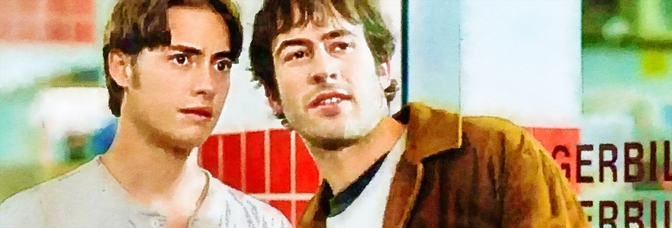Of all my youthful indiscretions, I think my affection for Kevin Smith is–today–the most embarrassing, simply because it perplexes me. I watch Mallrats and I don’t get how I could have watched and liked this film multiple times. By 2000 or so, I didn’t. But from 1996 to 1999, I must have watched this film six or seven times and thought it was good. Even the things I thought were good about–things I thought I would still think were good about it (namely, Jason Lee)–they aren’t good. He isn’t good. He’s bad. His acting is bad. All of the acting is bad. Jeremy London is worse than Lee and I am a little surprised Shannen Doherty is so much better than Claire Forlani, but I just can’t believe I sat and watched this movie.
I rented the ten year anniversary edition because it finally has the original cut. On the original DVD, there are deleted scenes and a lot of talk about the longer version, and it has been a while since I’ve Mallrats. I thought maybe I was wrong. No, I didn’t. I thought at the least, I’d laugh. But it’s not funny. Maybe Kevin Smith’s Mallrats style has so saturated modern Hollywood film I can’t appreciate it for the constant… no, I lost the thought it was so silly. Essentially, the longer edition makes the film more about Jeremy London, which is not a good idea, because it means Claire Forlani is in more scenes and Michael Rooker is more scenes. The film finally gets to the mall at the thirty-five minute mark, after the first act, making the title a little perplexing. The additional footage probably makes the film better, because it gets worse when they get to the mall. Smith isn’t in his element anywhere in this film–I kept thinking about Clerks’ tight opening and the lack of one in Mallrats, theatrical or extended versions.
Mallrats is an incredibly influential film–it created the expectations of a significant portion of a filmgoing generation. This film was a big video hit and, though the general “fanboy” public has abandoned him, Smith tapped something the audience desired in Mallrats. The film is not good, the characters are not good–the dialogue is stagy and bad and a high school drama class could do better–but it connected. It’s filled with pop culture references and bad dirty jokes and people (unfortunately, mostly of my age group) wanted this experience. And they didn’t grow out of it because Mallrats isn’t about actual film reference, like Tarantino’s films. It’s about faking it.
I realize Mallrats doesn’t deserve all this vitriol (the audience’s reaction is offensive, not the film itself; the film is just awful), but I really didn’t know how bad a film it truly is… and, of course, I’m only angry at myself because I was a member of said audience.

Leave a Reply